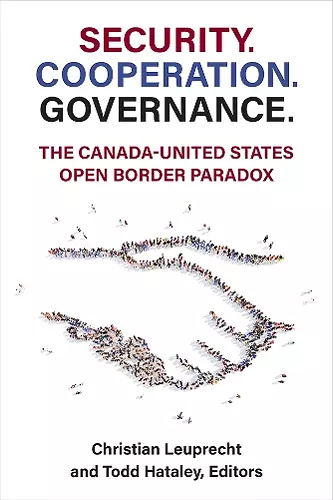Security. Cooperation. Governance.
The Canada-United States Open Border Paradox
Christian Leuprecht author Christian Leuprecht editor Todd Hataley editor
Format:Paperback
Publisher:The University of Michigan Press
Published:25th Oct '23
Should be back in stock very soon

Historically, national borders have evolved in ways that serve the interests of central states in security and the regulation of trade. This volume explores Canada–US border and security policies that have evolved from successive trade agreements since the 1950s, punctuated by new and emerging challenges to security in the twenty-first century. The sectoral and geographical diversity of cross-border interdependence of what remains the world’s largest bilateral trade relationship makes the Canada–US border a living laboratory for studying the interaction of trade, security, and other border policies that challenge traditional centralized approaches to national security.
The book’s findings show that border governance straddles multiple regional, sectoral, and security scales in ways rarely documented in such detail. These developments have precipitated an Open Border Paradox: extensive, regionally varied flows of trade and people have resulted in a series of nested but interdependent security regimes that function on different scales and vary across economic and policy sectors. These realities have given rise to regional and sectoral specialization in related security regimes. For instance, just-in-time automotive production in the Great Lakes region varies considerably from the governance of maritime and intermodal trade (and port systems) on the Atlantic and Pacific coasts, which in turn is quite different from commodity-based systems that manage diverse agricultural and food trade in the Canadian Prairies and US Great Plains.
The paradox of open borders and their legitimacy is a function of robust bilateral and multilevel governance based on effective partnerships with substate governments and the private sector. Effective policy accounts for regional variation in integrated binational security and trade imperatives. At the same time, binational and continental policies are embedded in each country’s trade and security relationships beyond North America.
“This book makes the case that a border is not a uniform dividing line between sovereign states but a series of interlinked channels between distinct communities. It is a unique piece of scholarship that demonstrates how border policies related to security, immigration, and trade are tied to regional preferences, mediated by federal and binational policymakers.”
-- Laura Dawson, Executive Director of the Future Borders Coalition“This book presents a richly detailed picture of the border between the United States and Canada. It makes clear that we can have trade and security at the same time. Policymakers will want to refer to this book for evidence that if we approach the border in a smart way, if we dedicate adequate resources, and if we use technology creatively, the United States and Canada can stay safe, secure, and economically competitive.”
-- David Jacobson, Former United States Ambassador to Canada“I found Security. Cooperation. Governance. The Canada-United States Open Border Paradox to be exceptional in presenting a compelling view of the dynamic cross-border regional cooperation and collaboration that impacts border security, policy, and culture across the US–Canada border.”
-- Matt Morrison, Executive Director and CEO of the Pacific NorthWest Economic Region"Taken together, the contributions to this volume offer an account of a specific form of international relations in which cooperation is not stymied by contradictory interests or uneven commitments, but by a tension inherent in a collaborative project. This volume serves as a thoroughly informative corrective to state-centric reflexes that might produce zero-sum thinking that both countries are interested in avoiding."
-- H-Net, Daniel Troup"The book certainly succeeds in its aim of moving on by showing how the logic of realist international relations is transformed by the interaction of security, economic, and political concerns, but also by different conditions and institutions along a common border. It also provides a genuinely comparative analysis of a subject too often confined to single case studies."
-- Publius"Leuprecht and Hataley provide an important account of how international borders are influenced by the factors proper to each region. They show that borders should not be understood as monoliths but rather as organic entities developing in their specific context."
* Carlos Daniel Gutierrez Mannix, Journal of Borderland Studies *“The argument that security, cooperation, and governance function at multiple levels and in diverse ways across the entirety of the border should spark some hope that the Canada-US relationship(s) will survive despite the problems ongoing between the federal governments. This is perhaps the greatest strength of this book--that the local context and the multiplicity of relationships that unite regions across the border have a long and deep history that can withstand an attempt by the current American administration to dismantle that relationship from above.”
* James M. Hundley, American Review of Canadian Studies *“It should surprise no one that Canada's regions have for some time been laboratories of creativity and problem solving, generating pragmatic soltions to seemingly intractable border challenges. Leuprecht, Hataley et al. systematically capture and illuminate those innovations for everyone interested in how border policy is developed and administered.”
* Roy Norton, Canadian Journal of Political ScienISBN: 9780472055715
Dimensions: unknown
Weight: unknown
232 pages